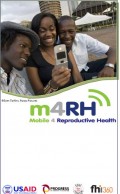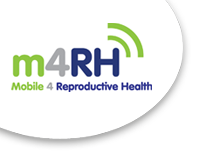About
The Mobile for Reproductive Health (m4RH) service is an award-winning automated, interactive, and on-demand short message service (SMS, or text message) system that provides simple, accurate and globally relevant information on reproductive health. Developed in 2009 and piloted in Kenya and Tanzania, m4RH was one of the first services to take advantage of the increasing ubiquity of cell phones to put accurate reproductive health information and decision making directly into the hands of those who need it. Since then, m4RH has expanded its content and reach and has been adopted and adapted by organizations around the world.
The beginning of m4RH
FHI 360 conceptualized, deployed, and tested m4RH as part of a pilot study aimed at determining the feasibility of providing family planning (FP) information via text message, the reach of this communication channel, and its suggested impact on FP use in Kenya and Tanzania. FHI 360 systematically developed m4RH content using best practices for health communication by engaging country-specific target audiences; identifying their attitudes, needs, and practices related to contraception; and creating and testing targeted messages to meet those needs based on global and country-level family planning guidance documents such as the WHO Family Planning Handbook. FHI 360 partnered with the technology non-profit, Text to Change, to build the technological system, and with Ministries of Health and multiple public health partners to promote the service. m4RH originally provided only the most basic and essential information about family planning as well as information on the location of clinics.
Expansion and adaptation
Soon after the pilot, FHI 360 developed new content for m4RH in direct support of contraceptive continuation. The new content focuses on:
- Management of side effects;
- Addressing common barriers and misconceptions about specific FP methods;
- Further addressing benefits of method use; and
- Role model stories, or story installments modeling positive health attitudes, norms, and behaviors.
This expanded content has reached nearly 300,000 unique users in Tanzania, where the system operates at scale, averaging thousands of hits per day.
FHI 360 has also adapted m4RH for young people 10-24 years old in Rwanda, Tanzania, and Uganda and added additional content on puberty, sex, pregnancy, health choices, gender-based violence, and dual protection.
To guide the process for adapting m4RH for new populations, settings, and content areas, FHI 360 developed a 10-step content adaptation and implementation framework grounded in in research utilization and communications science and literature. The framework is relevant and informative for many initiatives that leverage social and digital media for health improvement.
“m4RH gave me courage to go and choose a method at the clinic.” —Female, Age 31
Positive results
FHI 360 had deployed SMS survey questions to collect demographic data about our users and to ask them how m4RH has impacted their lives. Overall, m4RH reaches a diverse group of users, including key target groups for FP programs such as men and young people. These users find m4RH to be an acceptable format for receiving FP information, and appreciate the convenience and privacy of this channel. Some m4RH users report use of the service increasing their knowledge about FP, improving communication with a partner, and leading them to take up a method. In addition, a randomized controlled trial conducted by Abt Associates in Kenya in 2013 demonstrated a 13% improvement in family planning knowledge after 3-months among m4RH users compared to a control group.
Pathways to sustainability
In 2014, m4RH was awarded a grant from the IWG Catalytic mHealth Grant Program to identify pathways to sustainability. Under this grant, FHI 360 has conducted cost-effectiveness analyses and modeling, has implemented a licensing program to expand reach of the service, and is exploring innovative public-private approaches to reduce costs and identify potential revenue streams. Through this grant, FHI 360 hopes to achieve a more sustainable cost-structure for m4RH that will encourage continued growth and expansion while contributing valuable lessons learned to the global mHealth community.
Tools & Resources
-

m4RH Brochure
The m4RH brochure provides overview information about this innovative approach to improving family planning services.
https://m4rh.fhi360.org/wp-content/uploads/2015/04/m4RH-Booklet.pdf
-
m4RH Women Deliver 50! Award
In March 2012 Women Deliver and its supporters named m4RH as one of the “Women Deliver 50” of 2012.
https://m4rh.fhi360.org/wp-content/uploads/2015/03/Women-Deliver-50.pdf

